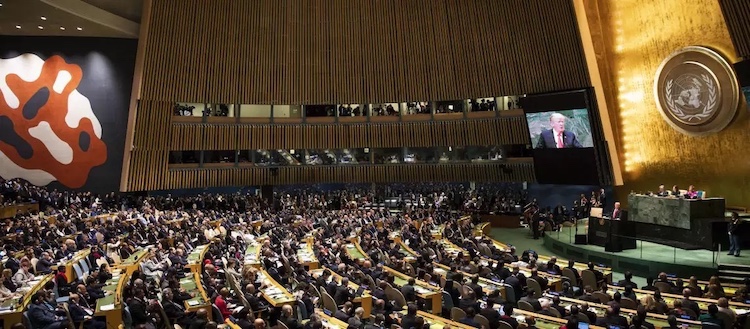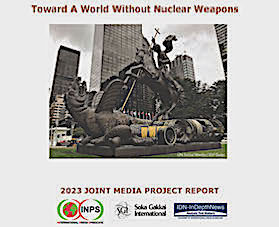Hypocrisy & Outright Lying by Nuclear-armed States
By Jackie Cabasso
The writer is Executive Director, Western States Legal Foundation, who participated in the Tenth NPT Review Conference, which concluded on August 26.
NEW YORK (IDN) — The 10th NPT Review Conference didn't fail because it couldn't produce a final document. It failed because the nuclear-armed states haven't made good on their fundamental nuclear disarmament obligation under Article VI of the Treaty, undertaken 52 years ago, nor on the promises and commitments to action items that would lead to nuclear disarmament they agreed to in connection with the indefinite extension of the Treaty in 1995 and in the 2000 and 2010 final documents.
To the contrary, it's almost as if these commitments have gone into reverse. All of the nuclear-armed states are diverting vast sums of human and economic resources by engaging in programs to qualitatively, and in some cases, quantitatively upgrade their nuclear arsenals; the role of nuclear weapons in "security" policies is increasing, and nuclear threats are being made openly and covertly, justified as legitimate components of nuclear "deterrence".
In 1946, Lewis Mumford wrote, "You cannot talk like sane men around a peace table while the atomic bomb itself is ticking beneath it. Do not treat the atomic bomb as a weapon of offence; do not treat it as an instrument of the police. Treat the bomb for what it is: the visible insanity of a civilization that has ceased to worship life and obey the laws of life."
Sitting in the basement of the United Nations for the last four weeks, observing the NPT sessions that were open to civil society, was literally like watching mad (mostly) men around what's supposed to be a peace table, now with the hydrogen bomb ticking beneath it.
At present, it is most blatantly Russia that is threatening and using force against the territorial integrity and political independence of another State, namely Ukraine, including by militarily occupying the largest nuclear power plant in Europe, Zaporizhzhia, while both sides accuse each other of shelling the plant.
In the closing plenary late Friday (August 26) night, Russia's refusal to accept language in the draft final document expressing "grave concern for the military activities conducted near or at…. the Zaporizhzya nuclear power plant, as well as the loss of control by the competent Ukrainian authorities over such locations as a result of those military activities…" and other language concerning Zaporizhzya, was the apparent reason consensus could not be reached on a final document.
Reportedly, Russia had wanted Ukraine to be blamed for the shelling at Zaporizhzya, and although Russia was not named in the draft document, early on it should have been clear to the States parties, particularly the United States and its NATO allies, that this language would be rejected by Russia.
Asserting that the language was "blatantly political," Russia claimed that if consensus could not be reached it was because many delegations did not agree on a host of issues. Indeed, it was clear from the closing statements that many governments, especially those from the global south, were dissatisfied with the draft final document.
While indicating that they would have been willing to go along with it as an expression of solidarity during a time of grave international crisis, they felt it was very weak, with many shortcomings—particularly the lack of benchmarks, timelines and measurable goals for nuclear disarmament.
While the nuclear-armed states had apparently been willing to accept vague recommitments to previous obligations in the draft final document, they were not willing to commit to any concrete pathway to get there.
In a draft document the four other nuclear-armed States must have known would fail to achieve consensus, this can only be viewed as the epitome of bad faith, during a four-week festival of double standards, hypocrisy and outright lying by the nuclear-armed states.
In my view, what happened was the best outcome out of a menu of possible bad outcomes. If the weak final draft document had been adopted by consensus, it would have covered up the very real division of views among states parties and sent a misleading message to the global public that everything is OK.
By putting their grievances on the record, after it was clear that consensus had failed, the non-nuclear armed states put the nuclear-armed states on notice that they are not willing to tolerate "business as usual" any longer. I hope this has the effect of putting pressure on the nuclear-armed states to do something to demonstrate their commitment to their Article VI obligations during the next review cycle.
As Ambassador Alexander Kmentt said, on behalf of Austria: "We hope that the deeply unsatisfactory result of this review conference will serve as a wake-up call. Austria will not tire in our work to implement the NPT and the TPNW [Treaty on the Prohibition of Nuclear Weapons]. We have no other choice given the existential dangers and risks of nuclear weapons."
"Peaceful Uses"
An aspect of this Review Conference deserving greater scrutiny was the hyperbolic promotion of "peaceful uses" of nuclear technology by the International Atomic Energy Agency (IAEA) and most of the States parties, nuclear-armed and nuclear-weapons-free. Article IV of the NPT confers upon all States parties an "inalienable right" to peaceful nuclear technology. In the draft final document:
"The Conference underlines that IAEA activities in the field of technical cooperation and nuclear applications, contribute in an important way to meeting energy needs, improving human and animal health, combating poverty, protecting the environment, developing agriculture, managing the use of water resources, optimizing industrial processes and preserving cultural heritage, thus helping to improve the quality of life and the well-being of the peoples of the world."
In contrast to the lack of measures to advance nuclear disarmament going forward, the draft final document includes a long list of specific activities to further promote and expand "peaceful" uses of nuclear technology.
Listening to the governments' statements and reading their working papers, one might be led to believe that nuclear power will solve all of the world's problems. Yet, most if not all nuclear technology is inherently dual use.
Against the background of ongoing proliferation concerns and palpable alarm about growing nuclear dangers at Zaporizhzya, no one questioned the wisdom of re-legitimizing and reinvesting in "peaceful" nuclear technology. An examination of this paradox is called for. [IDN-InDepthNews – 28 August 2022]
Read also: The NPT: History and Background posted at http://wslfweb.org/docs/NPT-Background.pdf
Image: Tenth NPT Review Conference. Credit: GEDES













